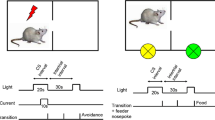Abstract
Water deprivation during inescapable shock exposure and a shuttle escape test 24 hours later (Experiment 1), during shuttle escape training only (Experiment 2), or during inescapable shock exposure only (Experiment 3a), ameliorated the shock-escape impairment normally seen following exposure to inescapable shock. The results of Experiments 1 and 2 could be attributed to increased activity produced by water deprivation during the shuttlebox test. However, the results of Experiment 3a suggest that water deprivation during inescapable shock exposure can eliminate the shock-escape impairment in a shuttlebox test 24 hours later. These results are discussed in relation to the motivational deficit predicted by learned helplessness theory.
Similar content being viewed by others
References
ANDERSON, D. C., CROWELL, C. R., CUNNINGHAM, C. L., & LUPO, J. V. (1979). Behavior during shock exposure as a determinant of subsequent interference with shuttlebox escape-avoidance learning in the rat. Journal of Experimental Psychology: Animal Behavior Processes, 5, 243–257.
BALLEINE, B., & JOB, R. F. S. (1991). Reconsideration of the role of competing responses in demonstrations of the interference effect (learned helplessness). Journal of Experimental Psychology: Animal Behavior Processes, 17, 270–280.
BOLLES, R. C. (1967). Theory of motivation. New York: Harper and Row.
CAMPBELL, B. A. (1960). Effects of water deprivation on random activity. Journal of Comparative and Physiological Psychology, 53, 240–241.
DESAN, P. H., SILBERT, L. H., & MAIER, S. F. (1988). Long-term effect of inescapable stress on daily running activity and antagonism by desipramine. Pharmacology Biochemistry and Behavior, 30, 21–29.
DINSMOOR, J. A. (1958). Pulse duration and food deprivation in escape-from-shock training. Psychological Reports, 4, 531–534.
FINGER, F. W., & REID, L. S. (1952). The effect of water deprivation and subsequent satiation upon general activity in the rat. Journal of Comparative and Physiological Psychology, 45, 368–372.
GLAZER, H. I., & WEISS, J. M. (1976a). Long-term and transitory interference effects. Journal of Experimental Psychology: Animal Behavior Processes, 2, 191–201.
GLAZER, H. I., & WEISS, J. M. (1976b). Long-term interference effect: An alternative to “learned helplessness.” Journal of Experimental Psychology: Animal Behavior Processes, 2, 201–213.
HALL, J. F. (1955). Activity as a function of a restricted drinking schedule. Journal of Comparative and Physiological Psychology, 48, 265–266
JACKSON, R. L., MAIER, S. F., & RAPAPORT, P. M. (1978). Exposure to inescapable shock produces both activity and associative deficits in the rat. Learning and Motivation, 9, 69–98.
KLEMFUSS, H., & SEIDEN, L. S. (1985). Water deprivation increases anterior hypothalamic norepinephrine metabolism in rats. Brain Research, 341, 222–227.
KONECKA, A. M., SROCZYNSKA, I., & PRZEWLOCKI, R. (1985). The effect of food and water deprivation on post-stress analgesia in mice and levels of beta-endorphin and dynorphin in blood plasma and hypothalmus. Archives Internationlae de Physiologie et de Biochimie, 93, 279–284.
LUTTINGER, D., & SEIDEN, L. S. (1981). Increased hypothalamic norepinephrine metabolism after water deprivation in the rat. Brain Research, 208, 147–165.
MACKINTOSH, N. J. (1974). The psychology of animal learning. New York: Academic Press.
MAIER, S. F. (1970). Failure to escape traumatic shock: Incompatible skeletal motor response or learned helplessness? Learning and Motivation, 1, 157–169.
MAIER, S. F., & SELIGMAN, M. E. P. (1976). Learned helplessness: Theory and evidence. Journal of Experimental General, 105, 3–46.
MAIER, S. F., SILBERT, L. H., WOODMANSE, W. W., & DESAN, P. H. (1990). Adinazolam both prevents and reverses the long-term reduction of daily activity produced by inescapable shock. Pharmacology Biochemistry and Behavior, 36, 767–773.
MINOR, T. R., CHANG, W-C., & WINSLOW, J. L. (1994). Stress and adenosine: I. Effect of methylxanthine and amphetamine on learned helplessness in rats. Behavioral Neuroscience, 108, 254–264.
MISSANIN, J. R., & CAMPBELL, B. A. (1969). Effects of hunger and thirst on sensitivity and reactivity to shock. Journal of Comparative and Physiological Psychology, 69, 207–213.
SELIGMAN, M. E. P., & MAIER, S. F. (1967). Failure to escape traumatic shock. Journal of Experimental Psychology, 74, 1–9.
WEISS, J. M., GLAZER, H. I., & POHORECKY, L. A. (1975). Coping behavior and neurochemical changes: An alternative explanation for the original “learned helplessness” experiments. In Relevance of the psychopathological animal model to the human. New York: Plenum Press.
WOODMANSE, W. W., SILBERT, L. H., & MAIER, S. F. (1993). Factors that modulate inescapable shock-induced reductions in daily activity in the rat. Pharmacology Biochemistry and Behavior, 45, 553–559.
Author information
Authors and Affiliations
Rights and permissions
About this article
Cite this article
Stromberg, M.F., Bersh, P.J., Whitehouse, W.G. et al. The effect of water deprivation on shock-escape impairment after exposure to inescapable shock. Psychol Rec 47, 335–350 (1997). https://doi.org/10.1007/BF03395229
Published:
Issue Date:
DOI: https://doi.org/10.1007/BF03395229




